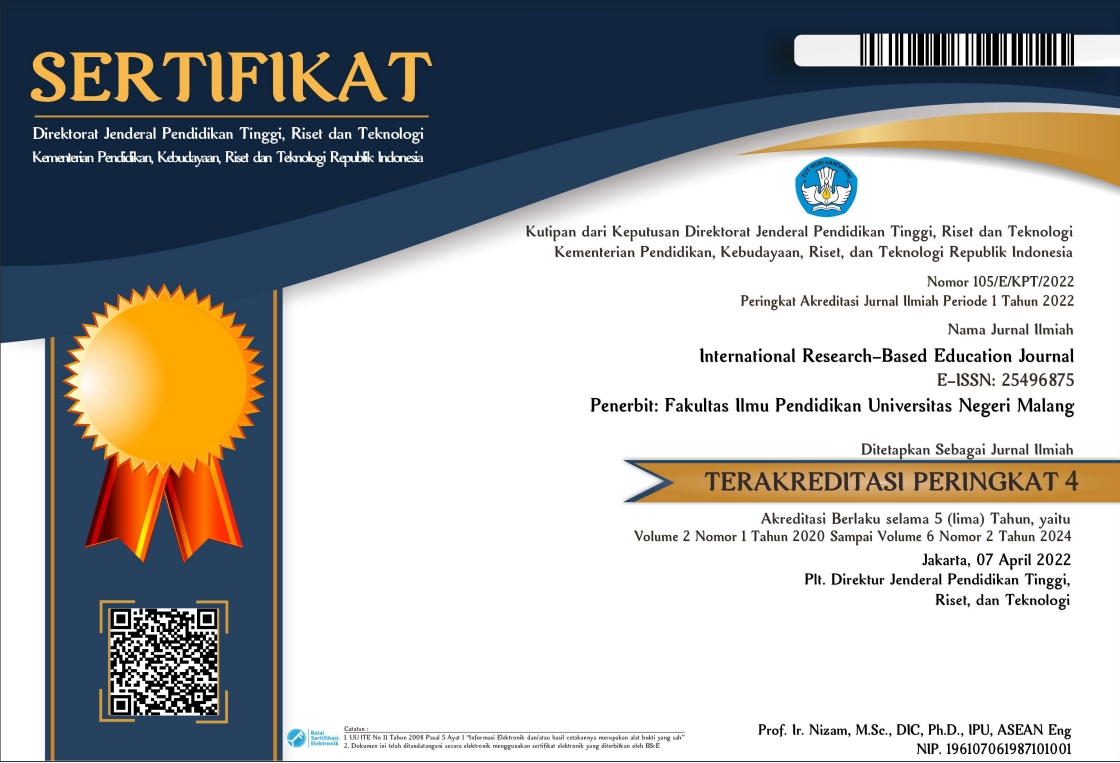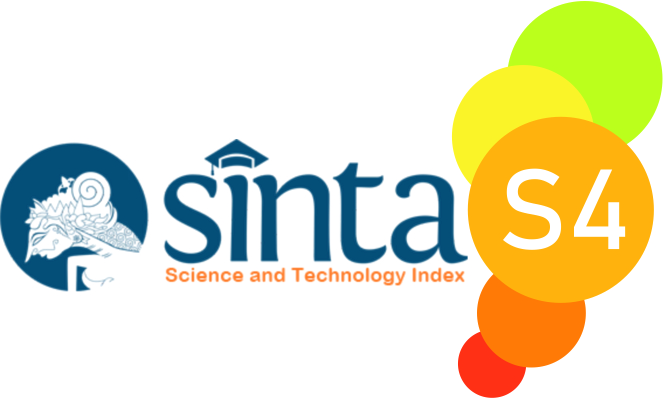THE MAPPING OF UNIVERSITY STUDENT’S BACKGROUND, EXPECTATION, AND ENTREPRENEURSHIP VIEW ON FUTURE CAREER
Abstract
This research aims at: 1) mapping university student’s background, 2) expectation university students on future career, 3) finding out the differences of student’s background and expectation. This research uses descriptive comparative method. The population of this research is students of AP FIP UM and MP FIP UNESA. The number of sample is 248 respondents from 743 populations. Data is taken using questionnaire. The results are: 1) most students are from East Java and graduated from Senior High School. The parents’ highest educations are from Senior High School. Parents’ occupation is businessmen. Students’ interest is art. Most parent’s expectation that their children will reach career as public servant (PNS). 2) Students college after graduation, they have expectation to work in the field of education on the staff of the Ministry of National Education. Non-educational field, they have hopes to be an employee of Bank. 3) Based on group variable university, sex, and student year, there are similarities and there are differences.
Keywords: mapping students’ background, expectation, future career, entrepreneurship
Keywords
Full Text:
PDFReferences
Alma, B. (2007). Kewirausahaan untuk Mahasiswa dan Umum. Bandung: Alfabeta.
BPS. (2016). Agustus 2015: Tingkat Pengangguran Terbuka (TPT) Sebesar 6,18 Persen. (Online), (https://www.bps.go.id/Brs/view/id/1196),
Dewianataria. (2013). Apa itu Bakat dan Minat? (Online), (http://m.gadis.co.id)
Duening, T.N. (2010). Five Minds for the Entrepreneurial FutureCognitive Skills as the Intellectual Foundation for Next Generation Entrepreneurship Curricula. January/June 2010 vol. 19 no. 1 1-22. (Online), (http://joe.sagepub.com).
Fajriyah, N. (2016). Bakat Khusus. (Online), (http://newrulfajri.wordpress.com)
Hattab, H.W. (2014).Impact of Entrepreneurship Education on Entrepreneurial Intentions of University Students in Egypt. The Journal of Entrepreneurship. March 2014 vol. 23 no. 1 1-18. (Online), (http://joe. sagepub. com/ content/23/1/1.abstract).
Hendro. (2011). Dasar-Dasar Kewirausahaan (Panduan bagi Mahasiswa untuk Mengenal, Memahami Dunia Bisnis). Jakarta: Erlangga.
Irsyadi, A.Y. (2012). Pengaruh Bimbingan Karir dan Pola Asuh Orang Tua terhadap Kemandirian Siswa dalam Memilih Karir Kelas XI Jurusan Teknik Instalasi Tenaga Listrik SMk Negeri 1 Sedayu. Thesis unpublished. Yogyakarta: Program Studi Pendidikan Teknik Elektro Fakultas Teknik Universitas Negeri Yogyakarta.
Iwantono, S. (2002). Kiat Sukses Berwirausaha. Jakarta: Gramedia.
Karimi, S.; Biemans, H.J.A.; Lans, T.; Chizari, M.; Mulder, M.; & Mahdei, K.N. (2013). Understanding role Models and Gender Influences on Entrepreneurial Intentions Among College Students. Procedia - Social and Behavioral Sciences. 3rd World Conference on Learning, Teaching and Educational Leadership. Volume 93, 21 October 2013, Pages 204-214. (Online), (http://www.sciencedirect.com/science/article/pii/S1877042813032825).
Koe, W.L. (2016). The relationship between Individual Entrepreneurial Orientation (IEO) and entrepreneurial intention. (Online), (https://journal-jger.springeropen.com).
Kompasiana. (2014). Apa Arti Karir Sebenarnya? (Online), (http://kompasiana.com)
Lahadalia, B. (2016). Jumlah Pengusah di Indonesia Baru 1,5% dari total Penduduk. (online), (http://www.suara.com).
Lestari, E. (2014). Persepsi dan Harapan Mahasiswa Jurusan Administrasi Pendidikan Fakultas Ilmu Pendidikan Universitas Negeri Malang terhadap Karir Masa Depan. Thesis Unpublished. Malang: UM.
Levin, J., & Milgrom, P. (2004). Introduction to Choice Theory. (online), (http://web.stanford.edu/~jdevln/Econ, 20202)
Mendatu, A. (2014). Mendesain Karir Masa Depan. (Online), (http://achmantomendatu.blogspot.co.id), diakses 2 Oktober 2016.
Nasr, K.B. & Boujelbene, Y. (2014). Assessing the Impact of Entrepreneurship Education. Procedia - Social and Behavioral Sciences. Volume 109, 8 January 2014, Pages 712-715. (online), (http://www.sciencedirect.com/science/article).
Norashidah. (2014). Impact of Entrepreneurial Education on Entrepreneurial Intentions of Pakistani Students. Journal of Entrepreneurship and Business Innovation. ISSN 2332-8851. 2015, Vol. 2, No. 1. (Online), (http://dx.doi.org/10.5296/ jebi. v2i1.7534).
Rao, S. (2014). Nurturing entrepreneurial women: Insights from a developing country. Journal of Entrepreneurship in Emerging Economies. Vol. 6 Iss: 3, pp.268 – 297. (Online) , (http://www.emeraldinsight.com).
Ratten, V. (2014). Encouraging collaborative entrepreneurship in developing countries: the current challenges and a research agenda. Journal of Entrepreneurship in Emerging Economies, Vol. 6 Iss: 3, pp.298 – 308. (Online), (http://www.emeraldinsight.com/doi/pdfplus/10.1108/JEEE-05-2014-0015).
Supriatna, N., & Mamat Ruhimat, K. (2006). Ilmu Pengetahuan Sosial (Geografi, Sejarah, Sosiologi, Ekonomi). Jakarta: Grafindo Media Pratama.
Tlaiss, H.A. (2014). Women’s Entrepreneurship, Barriers and Culture: Insights from the United Arab Emirates. September 2014 vol. 23 no. 2 289-320, (Online), (http://joe.sagepub.com).
Wakawimbang, J.H. (2012). Kepemimpinan Pendidikan yang Bermutu. Bandung: Alfabeta.
Widyasari, Y. (2010). Persepsi Mahasiswa Akuntansi Mengenai Faktor-Faktor yang Membedakan Pemilihan Karir (Studi pada Universitas Diponegoro dan Unika Soegijapranata). Skripsi tidak Diterbitkan. Semarang: Fakultas Ekonomi Universitas Diponegoro.
DOI: http://dx.doi.org/10.17977/um043v1i1p%25p
Refbacks
- There are currently no refbacks.

This work is licensed under a Creative Commons Attribution-NonCommercial-ShareAlike 4.0 International License.










1.png)


